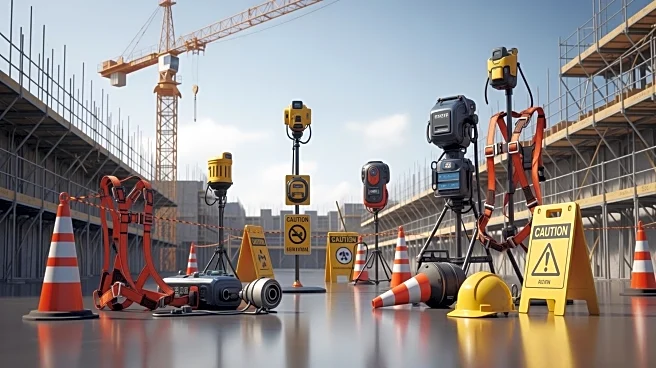What's Happening?
The Health and Safety Executive (HSE) has announced a review of the Lifting Operations and Lifting Equipment Regulations (LOLER), aiming to modernize compliance processes in the construction industry.
Since its inception in 1998, LOLER has been instrumental in promoting risk-based management by ensuring equipment is strong, stable, and properly maintained, and that operations are supervised by competent personnel. Despite the construction industry's embrace of digital technology, compliance processes remain largely paper-based, leading to inefficiencies and potential safety risks. The HSE's review seeks input from industry stakeholders to identify areas for improvement, with a focus on reducing friction and enhancing clarity without compromising safety standards.
Why It's Important?
The review of LOLER is significant as it addresses the outdated compliance processes that hinder efficiency and safety in the construction industry. By transitioning to digital records, the industry can improve the speed and accuracy of compliance checks, reduce the risk of lost or incomplete documentation, and create a more transparent audit trail. This modernization effort could lead to safer work environments and more streamlined operations, benefiting contractors, equipment owners, and site managers. The move towards digital compliance aligns with broader industry trends and could set a precedent for other regulatory frameworks, enhancing overall safety and operational efficiency.
What's Next?
The HSE is inviting submissions from equipment owners, users, manufacturers, suppliers, and other stakeholders through an online survey, with the call for evidence open until November 11. This engagement process allows those with firsthand experience to contribute to shaping the future of LOLER compliance. The review is expected to result in updated guidelines that recognize digital evidence as robust and reliable, potentially leading to widespread adoption of digital compliance systems. Stakeholders are encouraged to participate actively to ensure the revised regulations meet the industry's needs while maintaining high safety standards.
Beyond the Headlines
The shift towards digital compliance in construction could have broader implications, including setting new industry standards for other sectors. It may also influence regulatory approaches in areas such as environmental compliance and workplace safety, promoting a culture of transparency and accountability. The adoption of digital systems could drive innovation in compliance technology, offering new business opportunities for tech companies specializing in digital record-keeping and data management solutions.









